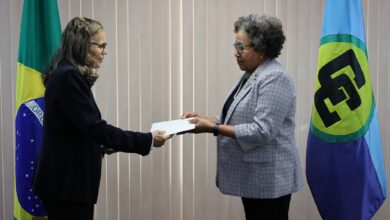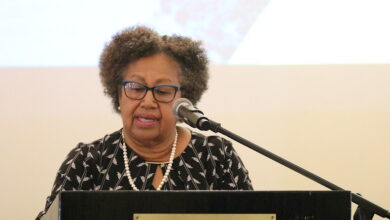Rt. Hon. Said Musa, Prime Minister of Belize
Honourable Ministers
Distinguished Secretary General, Dr. Edwin Carrington
Director General of the CRNM
Assistant Secretary-General
Members of the Public and Private Sectors
Distinguished Delegates
Members of the Media
Ladies and Gentlemen
The Government and people of Belize have provided excellent arrangements for this meeting of the Council for Trade and Economic Development (COTED), and have extended warm hospitality to us. I extend sincere appreciation to them, on behalf of all participants in this meeting, and on my own behalf.
This COTED meeting is convened at a time when the international economic environment is less than hospitable to the small states of the Caribbean Community (CARICOM), the majority of which are Small Island Developing States (SIDS). The paths we have pursued to economic development are sorely challenged, and many would not now pass a test of viability.
No matter how challenging it might seem for many of us, Globalization is the order of the day, and we are expected to live by the rules of the World Trade Organization. Both in respect of globalization and trade liberalization, we must contend with the unequal distribution of economic and political power, between the rich developed countries of the North, and the poorer developing countries of the South.
I believe that Cancun showed, beyond a doubt, that developing countries, including those of CARICOM, might not be as hapless as perceived. We know where our interest lay, and can take action to guard that interest, particularly when we are in accord.
I recall that CARICOM was in accord at Grand Anse in 1989 when it determined to establish a CARICOM Single Market and Economy, the CSME. None of the Heads of Government at Grand Anse would have considered the establishment of the CSME to be a straightforward process.
The process has indeed presented its peculiar challenges. They are, however, challenges, that we must meet, conscious that other new trading arrangements loom large. It is presumed that we will participate in the Free Trade Area of the Americas (FTAA) when agreements are reached on it. The FTAA negotiations are proceeding hand in hand with negotiations within the World Trade Organization, and with Europe.
Over the last day and a half, both at official and ministerial levels, we have examined external trade matters and negotiations in the three fora – the World Trade Organization, the FTAA and with Europe. Every indication is that we have very little to gain, and perhaps much to loose, if we face these negotiations individually, rather than in the context of broader regional integration, including the CSME.
We do have problems in our region, problems in intra-regional trade and in other significant areas. This meeting is expected to review technical and operational aspects of some of these problems. We must be prepared to make take positive steps for the resolution of any and all challenges, to ensure that they do not become impediments to our essential regional integration efforts.
A united CARICOM, speaking from the same page in all international fora, should be a priority for us all. There are matters on the international agenda which have the potential to negatively impact our growth and development. In the United Nations, for example, the issue of international cooperation on tax matters received considerable hearing during the Fifty-eighth Session of the General Assembly.
The Hon. Lynette Eastmond, Minister of Commerce, Consumer Affairs and Business Development of Barbados was a featured speaker in the discussion on international cooperation in tax matters. It is essential, now, for CARICOM countries to follow up developments in this area, lest action taken at the international level, work to our detriment.
In August of this year, the Barbados Programme of Action for the Sustainable Development of Small Island Developing States (SIDS) ten years on, will be reviewed at an international conference to be convened in Mauritius. CARICOM states have featured prominently in the preparatory process for this Conference. The Caribbean regional preparatory meeting was convened in Trinidad and Tobago in October 2003, and the Inter-regional preparatory meeting was convened in The Bahamas in January 2004.
It would be important for us all to participate at the highest level in the SIDS+10 Conference. If we do not, we will be unable to influence the processes and outcomes of the conference in a way that would be beneficial to CARICOM states. We should also urge high-level participation in the Conference, particularly by countries other than the SIDS.
CARICOM countries have also played an important role in the preparatory process for the UNCTAD X1 Conference, to be held this June in Brazil. It would be important, also, for CARICOM member states to participate in this Conference, as many of the issues, such as commodities, will be on the agenda of the Conference.
Let me take this opportunity to recognize the Government of Belize for acting decisively on the decision of CARICOM to establish a Caribbean Community Climate Change Centre in this country. I am sure we all will give this Centre our full support, cognizant of the impact of climate change on our fragile and vulnerable environments, and of international initiatives in this area.
Even as we seek to address economic and social development challenges, we are mindful that we do so as the situation in Haiti, the newest member of CARICOM, continues to deteriorate. We are all too painfully aware of the tumultuous period through which the Haitian people continue to pass. CARICOM’s position on this matter is well known, having been articulated in the Organization of American States, the United Nations Security Council and in meetings with officials of interested governments, including the governments of France, Canada and the United States.
CARICOM has been able to take the moral high ground in proposing a plan of action to resolve the problems in Haiti because of our record of democracy and stability. It is indeed a pity that the international community, including the Security Council, was slow to respond to our urging. We all hope, I am sure, that the suffering of the people of Haiti would soon come to an end. Economic and social development would be an essential element of the resolution of Haiti’s problems, and its long term prospects.
This COTED provides an invaluable opportunity for us to set clear policy objectives and the courses of action that would enable us to meet those objectives.
Let us be proactive in taking up the challenges of economic and social development, having in view the improvement in the standard and quality of life of all our people.
I welcome you to this Sixteenth Meeting of CARICOM’s Council for Trade and Economic Development and declare this Meeting open.
I thank you.






